"Rabbi Ovadia Told Me: 'Go Straight to the Court, Understood?'"
The reason Rabbi Ovadia refused to meet Ariel Sharon, the secrets revealed in his room, the profound halachic rulings, and his immense love for every Jew. Rabbi Yehuda Naki, who served the Rabbi for years, shares incredible memories from his remarkable household.
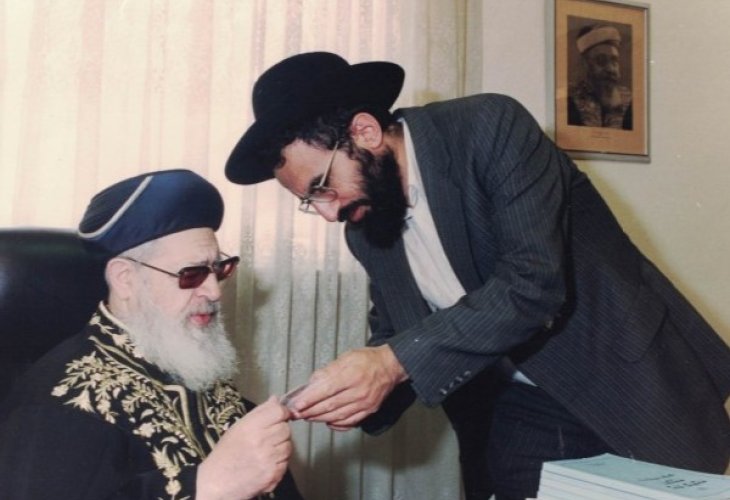 Rabbi Ovadia Yosef of blessed memory with Rabbi Yehuda Naki
Rabbi Ovadia Yosef of blessed memory with Rabbi Yehuda NakiFor over two decades, Rabbi Yehuda Naki was a close aide at the table of Rabbi Ovadia Yosef, who has since passed, witnessing hundreds and thousands of responses across all areas of Judaism. These days, he is completing the series of books 'Maayan Omer,' which include Rabbi Ovadia Yosef's responses on various issues, and shares fascinating revelations from these extraordinary answers he had the privilege to witness.
A Tremendous Mission
Rabbi Naki's path to the Gazit Chamber began almost by accident. At that time, shortly after his marriage, at only 23 years old, he studied diligently at the 'Chazon Ovadia' kollel at Porat Yosef Yeshiva, then headed by Rabbi Yitzhak Yosef, today's Chief Sephardic Rabbi of Israel and President of the Chief Rabbinate Council. To be accepted into the kollel, Rabbi Naki had to pass an entry exam with the head of the kollel, which he did successfully. Over time, as the Chief Rabbi's office expanded globally, there was a need for a young Torah scholar to serve Rabbi Ovadia Yosef. One of the young men at the kollel was appointed to the role, but shortly thereafter fell ill, necessitating a replacement. While other kollel members hesitated to take on this task, Rabbi Naki eagerly jumped at the opportunity. "I longed intensely for this chance, to have the opportunity to get close to Maran," he shares excitedly. "I took on the role, and since then, I served Maran for twenty-four years. Initially, it was in the Katamon neighborhood, close to fifteen years. Afterward, the office moved to the 'Yechaveh Da'at' study hall, until the Rabbi decided to move to his private home and operate on a smaller scale."
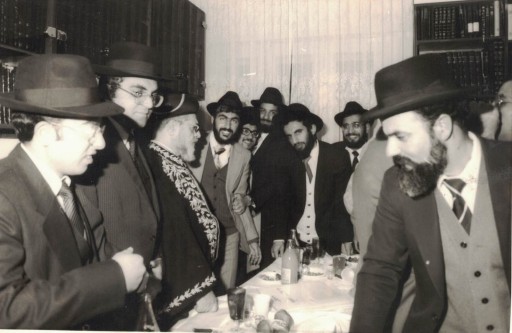
There is no doubt that it is an impressive achievement for a young scholar to be close to the most admired figure among the Sephardi community in particular, and the Jewish world in general. "I didn't serve Maran as a deputy, but as a clerk receiving orders and loyally executing them," Rabbi Naki modestly describes. Yet, the role was complex. "Part of the job required me to be with the Rabbi on Fridays until two hours before Shabbat, but I never saw it as a hardship. The role became more permanent after a while, and I had the privilege to serve him for over twenty years."
When I ask Rabbi Naki to elaborate on the writing of the books, he describes the process: "I would introduce the questioners to Rabbi Ovadia in my presence, summarizing the question briefly for the Rabbi, who would then ask further questions as needed. I didn’t settle for just my minimal role of serving Maran and being responsible for order, but I embarked on a grand project that was only recently completed, which was: writing his halachic responses and distributing them to many. For this endeavor, I would immediately write down the Rabbi’s answers so that they were preserved like an authentic dialogue. Our years of working together helped Maran save his time since the Rabbi understood my style and I understood his, enabling us to communicate between ourselves in shorthand."
In regard to Rabbi Ovadia Yosef's responses, Rabbi Naki says they were always concise and to the point. "After I arranged all the answers into a book, I presented the compilation to him. Maran reviewed it, and seeing the format with his brief response at the top and sources briefly at the bottom, he instructed me to re-edit the book from the beginning and include complete sources, so that the reader wouldn't have to search other books to fully understand the response. Once I did that, he warmly blessed me and signed off on these books with full approval."
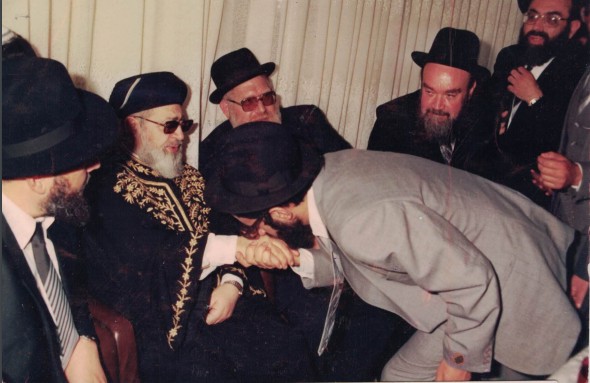
The Insulted Yet Not Insulting
Rabbi Naki recounts Rabbi Ovadia's sensitivity by recalling how even with those working under his direction, he always spoke with politeness and requests. "Maran, as the leader of the Shas movement, appointed people to head the movement. It would be natural for him to demand assistance for this or that Jew or various requests, as they were his appointees and he was at the head of the movement. Yet, he always maintained a tone of request. The Rabbi would call them and plead with them to fulfill his request. I once asked him in amazement: 'You need to plead? This is, after all, your appointee, and you appointed him.' But no, the Rabbi always requested with patience and modest charm," Rabbi Naki recounts in amazement.
However, during those years, Maran's path was not always a bed of roses. From time to time, the Rabbi would suffer humiliations and verbal attacks against the movement he founded, yet he remained resolute. "After every such saga, the Rabbi would forget everything as if nothing had happened, and even assisted people who spoke against him, without mentioning a word about their disgraceful behavior," Rabbi Naki explains. He also recalls an interesting story: "Some time after one of the election campaigns where Shas succeeded and increased in mandates, one of the people who opposed him during the election campaign came to request his help for something. One of the people revolving around Maran refused to let him in. 'What? He's not ashamed? After everything he did to the Rabbi now he comes to ask for something?' I told him: 'Listen, you're not the head of the house here, ask the head of the house if to let him in or not.' We asked the Rabbi, and he told us: 'He can come in.' The guy couldn’t believe his ears and thought that perhaps the Rabbi doesn’t remember what happened. He approached the Rabbi and whispered: 'Rabbi, don't you remember what this man did? He fought against Shas.' However, the Rabbi remained adamant: 'It doesn’t matter, he needs help now, come on, help him.'"
Rabbi Naki is quick to quell the thoughts that Maran had it easy. "People reading the Rabbi's history today think his entire life was smooth sailing. But all of Maran's years were accompanied by battles. Not a year or two went by without someone opposing him, each time a different scandal, different issues, and the Rabbi overlooked it all like a lion. From my perspective, I felt terrible; how much could the Rabbi's heart be torn? But the Rabbi moved past everything as if nothing had happened. However, this is what characterized his giant character and the course of his life that he skillfully crafted.
"Maran wasn’t concerned with anything except the holy Torah," Rabbi Naki asserts. "He was the only one who didn’t spare his dignity. The only thing that mattered to him was what Hashem wanted from him for the sake of the Torah, and he would do everything for it, even at the cost of humiliation."
Despite everything, Rabbi Naki claims there were never moments of breaking for his Rabbi. "Never did I see Maran break from anything. If there were moments that seemed to me like breaking points – they were during audience hours when he would listen and tearfully empathize with the common folk who came to plead and beg for the troubles of their souls."
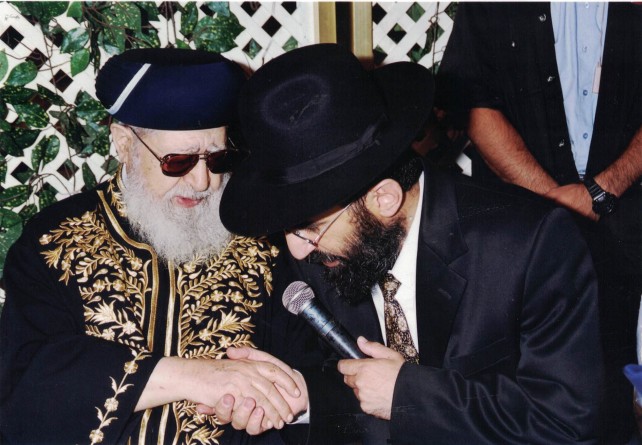
Rabbi Naki had the privilege to be beside Rabbi Ovadia Yosef during fascinating and fateful times. "It was during the transition between the end of his tenure at the Chief Rabbinate and the founding of the Shas movement. Although I did not partake in the political context, I had the fortune to see a true leader who felt the burden of Torah learners on his shoulders, and who led Sephardic Jewry as if carrying a child. At one point, Maran faced a critical decision regarding Shas's joining the coalition with Meretz. The debate stirred a global storm. Some supported this side, others the opposite. After tough deliberations and out of concern for the Torah world, Maran ultimately ruled in favor of joining, and Shas entered the coalition. "We have no choice; if Shas doesn't join the government, then all the yeshivas could collapse," Maran justified his decision. Rabbi Ben Zion Abba Shaul saved the situation by issuing a halachic ruling requiring everyone to heed Maran's opinion, which created a favorable wind within the movement. However, in other ultra-Orthodox sectors, the move wasn't viewed favorably.
"One day after the decision, the Rabbi of Arloi came to the office with his aide. Since I knew they had close friendly relations from years past, we immediately entered him to the Rabbi, and the aide remained outside. I asked the aide, puzzled at the Rabbi's visit: 'Shas has already joined the government, so what does he want, for us to leave it? Or in other words, what's the purpose of the Rebbe's visit?' He replied that he himself didn’t know why the Rabbi asked to come, 'He just told me to bring him to Maran, and so I did.' After fifteen minutes, when the meeting ended, I entered Maran's room to try and understand the Rebbe's request. Maran was very moved: 'Did you hear what he told me? He said he came on behalf of the Council of Torah Sages members to commend me, you saved the Torah world.' They understood it was a necessary step. Now, after Shas joined the coalition, the Rebbe came to bolster the Rabbi's spirit. Fifteen, twenty minutes after the meeting, the Rabbi of Arloi's aide came back. He told me: 'The Rebbe sent me to you. I told him about your puzzlement over the meeting's purpose, and he told me: 'Go to him and tell him that I came to thank the Rabbi for entering the government and thanking them for saving the Torah world.' Today, in retrospect, everyone understands that Maran was right," Rabbi Naki concludes his incredible story.
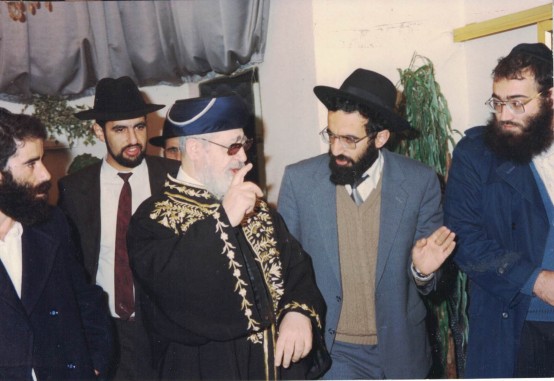
When Maran Rejected Sharon
Rabbi Naki recalls another fascinating story: "When Ariel Sharon was a minister in the government, his office staff contacted us requesting a meeting between the minister and the Rabbi. When the Rabbi heard this, he declined. 'Meetings with Sharon take a long time, and not all are necessary,' Maran explained. I responded to Sharon's office that the Rabbi currently doesn't have time for a meeting. A few minutes passed, and activists from a proximity organization appeared at the house entrance. 'What happened?' I asked. 'There's a boy they want to enroll in yeshiva, and the parents oppose.' The Rabbi instructed such cases to enter without waiting. I let him in immediately. For meetings with Sharon, the Rabbi couldn't find time. But to meet a young boy to persuade him to study Torah, he had all the time in the world. The Rabbi's unwavering devotion to Torah dissemination and spreading it among the Jewish people was witnessed in Maran's every step."
Over the years, Maran instructed Rabbi Naki to answer some questions himself, until one fateful day caused Rabbi Naki to stop doing so. Rabbi Naki recounts: "One day, a case of a woman who wanted to return to her husband came to Maran's desk. I heard the story and understood that the couple lived without a formal marriage. According to her, it was permissible to rule that there were no marriage rites, so she was allowed to return to her husband and marry according to Jewish law." The 'bride' promised Rabbi Naki that from now on, she would live only with a proper marriage, and she "just wanted to know if it was allowed". "Hearing the question, one would understand that according to halacha there was no obstacle, but nonetheless, I didn’t respond on my own and went to ask Maran's opinion." To his shock, Maran replied: "Let her ask the court." "I said to the Rabbi, 'Why does she need to go to the court? There was no ceremony, no marriage, nothing, what's the question?' But Maran insisted. He told me: 'Did you hear? I said let her go to the court.' I returned to the woman and relayed Maran's words. From the candid conversation with the woman, I understood that, unlike the last time, this time she intended to conduct a proper marriage. But during the conversation, she explained that although there was no formal marriage, she attended a party with that young man, and he told her at the party 'You are betrothed' and even gave her a ring.
"Just hearing that, all my hair stood on end. If he gave her a ring and said 'You are betrothed to me', and there were two observant Jews present, then she is a married woman, and is actually forbidden," Rabbi Naki shudders. "I immediately understood Maran's intention behind 'let her ask the court.' I was amazed to see Maran foresaw everything; he knew the hidden and the unasked. I realized that Maran's rulings had celestial protection, and all his rulings are holy to Hashem." Since then, Rabbi Naki stopped issuing answers himself, and for every question, he would approach Maran to ask his opinion, even though Maran instructed him to respond. "Seeing this case, I told myself: I'm not willing to answer questions anymore. Who knows, maybe details are missing in the question? For Maran, heavenly protection exists. For me? Who knows?"
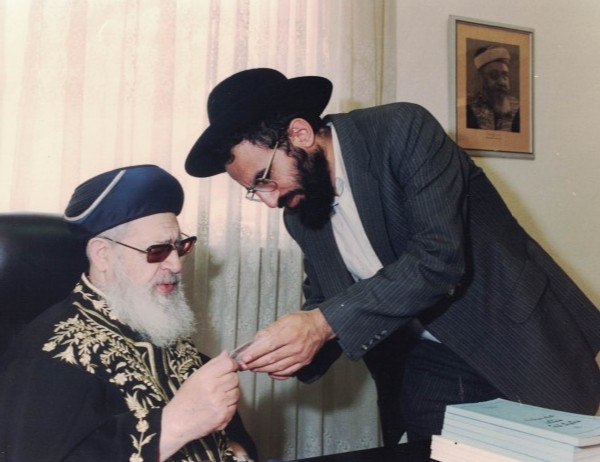
I ask Rabbi Naki to tell a halachic response with a fascinating story behind it, and he chooses the following tale: "One day, a complex question reached Maran: A woman married a man but did not have children with him. During the husband's work, he was killed, but she had a child before her marriage to the deceased husband. Now Maran was asked if this woman needed a 'chalitzah' or not. Her brothers were unwilling to perform the chalitzah, and she wanted to marry someone. The Rabbi deliberated until he permitted her as a widowed woman without chalitzah. I asked Maran: 'How do you trust her?' And he answered me: 'She swore that the child isn't from anyone else.' I asked the Rabbi how such a woman's oath could be trusted? But the Rabbi held his ground, 'I explained to her how severe an oath is, and she undoubtedly replied the truth.' Shortly thereafter, it was revealed that the guy she wanted to marry was a Kohen, and a Kohen is prohibited from marrying a chalutzah but allowed to marry a widow. This knowledge was like a heavenly affirmation of the Rabbi's work, ensuring she was permitted as a widow."
There is no doubt that Maran was granted special heavenly assistance, and all his rulings were sharp, truthful, just, and mainly paved the halachic path for generations to come.
The questions that began in the Gazit Chamber didn't stop even after the crown and splendor were removed. Today, Rabbi Naki has to answer the questions himself, always trying to draw from matter to matter and from ruling to ruling, according to Maran Rabbi Ovadia Yosef's rulings of blessed memory.

